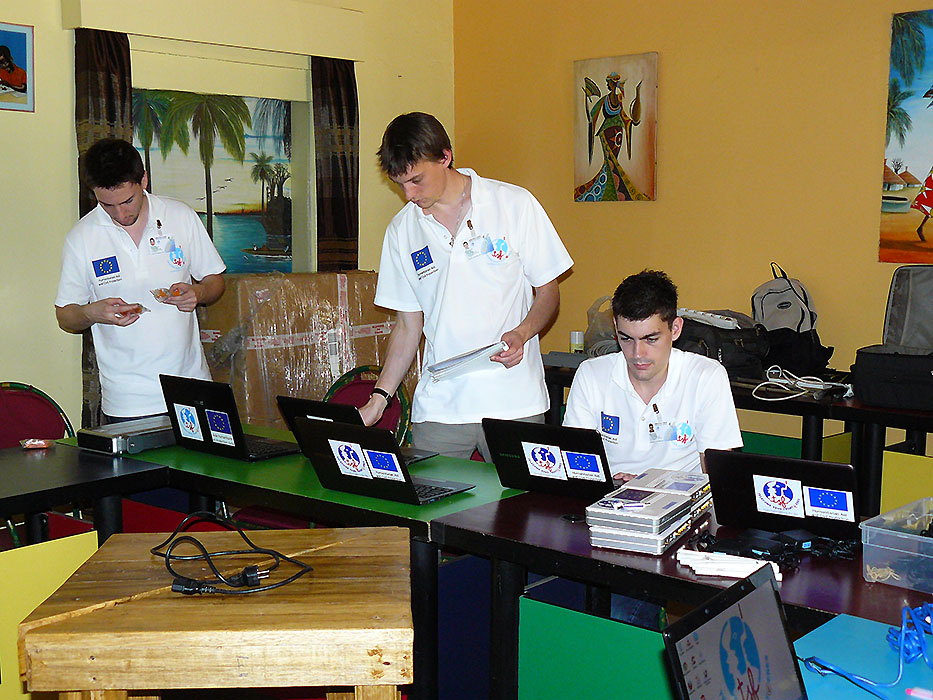International Workshop - Enhanced Response Capacity
Context: Post-emergency
Start date: 01/10/2012
End date: 30/09/2014
Areas of intervention:
- East Africa
- West Africa
- Central and South America
- South and South-East Asia
Activities: Capacity building
5 sessions of training
115 emergency workers trained
66 international NGOs trained
3 continents
34 countries
Context
During emergencies, information management and sharing is essential for an effective humanitarian response. When a crisis strikes, field teams must assess the situation and communicate vital information as quickly as possible, liaise with their headquarters and other emergency responders in the country, and mobilise donors while ensuring visibility and awareness. However, in emergency situations, telecommunications are often unavailable (services are disrupted or overloaded), slowing down the response system.
Improving local response capacity, strengthening the preparedness and capacity of emergency telecommunications NGOs allows better coordination among the humanitarian community, and increases the effectiveness of relief actions.
Training of emergency actors in ICT
This capacity building training is a continuation of programmes organised in 2009 and 2011 in Nicaragua for NGOs in Central and Latin America, and in Thailand for NGOs in Central and Southeast Asia. Funded by the European Civil Protection and Humanitarian Aid Operations (ECHO), TSF aimed to extend these training courses to vulnerable and disaster-prone regions of East and West Africa, but also to strengthen the capacities of actors involved in the emergency response in Latin America and Asia.
The beneficiary organisations were selected in collaboration with the regional experts of the European Commission, taking into account their vulnerability to natural disasters, the relevance of their interventions, their ability to set up teams or emergency offices, and their relations with other organisations.
A total of 100 government agents and NGO workers, mainly IT administrators and managers, were identified to be trained in the four defined geographical areas:
- In Bangkok from 18th to 23th March, 25 representatives of organisations active in South and South-East Asia (Afghanistan, Bangladesh, Cambodia, India, Indonesia, Laos, Malaysia, Myanmar, Nepal, Pakistan, Philippines, Sri Lanka, Thailand and Vietnam);
- In Managua from 6th to 11th May, 25 representatives of organisations active in Central and South America (Argentina, Bolivia, Chile, Colombia, Ecuador, Guatemala, Honduras, Nicaragua, Panama, Paraguay, Peru, Uruguay and Venezuela);
- In Dakar from 20th to 25th May, 25 representatives of organisations active in West Africa (Sahel region: Burkina Faso, Chad, Mali, Mauritania, Niger and Senegal);
- In Nairobi from 17th to 22d June, 25 representatives of organisations active in East Africa (Ethiopia, DRC, Kenya, South Sudan, Sudan and Zimbabwe).
A total of 66 international humanitarian organisations from 33 countries participated in the training sessions, including the International Committee of the Red Cross, UNHCR, Action against Hunger (ACF), Médecins Sans Frontières, CARE, ACTED, Oxfam, International Rescue Committee, Save the Children, Islamic Relief, Concern, International Plan, Merlin, etc.
These six-day field training sessions allowed beneficiaries to:
- Learn how to choose the telecom and IT technologies best adapted to an emergency response phase;
- Learn how to best use telecom and ICT equipment available during the emergency response phase;
- Transfer those skills in the future by training technicians from their own organisation.
The training consisted of different modules including:
- The module on ICT equipment used in emergency situations aimed to train participants in the use of ICT and services available during emergency response:
o Computer hardware and maintenance;
o Theory and practice of installing network connections;
o Wireless networks (Wi-Fi, point-to-point wireless connections);
o Mobile satellite communications (data and voice services);
o Fixed satellite services (VSAT);
o Mobile technologies for emergency response (3G, mobile data collection, information dissemination via SMS ...).
- The telecommunication management module in a crisis situation included elements such as the emergency response environment and emergency telecoms; the organisation of the telecom response; cost management and the preparation of a telecom budget.
- The final phase of the training consists of a practical exercise to simulate the deployment of emergency communications in a mock crisis situation.
Additional training session dedicated to ECHO staff
During the training in Nairobi, the project manager of the European Commission asked TSF if it was possible to organize an additional 1 week session following the current one in order for ECHO’s technical staff to also benefit from the knowledge gain.
With this additional session In Nairobi, TSF trained another 15 technical staff of the European commission representing 10 countries.
Programme follow-up
At the end of this programme, TSF remained available for remote support for one year thanks to an interactive technical support web portal, ICT Relief, to ensure the follow-up and thus the sustainability of the training.
In addition, online feedback forms were sent every 3 months to the participants to evaluate the usefulness of the acquired know-how. 45% of the participants were able to use this know-how during deployments in the year following the training; 8% of them consider that the documents provided during the training were very useful.
Beyond the satisfaction expressed by the participants and the evaluation of their progress, a survey carried out amongst participants’ managers revealed that the benefits of the training were not limited to the participants, but reached their colleagues via internal training, as well as the improvement of internal procedures and documentation related to ICT. Feedback forms sent to participants indicated that each participant trained 4 colleagues on average; 34% of the participants contributed to the improvement of the ICT procedures of their organisation following the capacity building programme. Finally, several managers were willing to renew the participation of their organisation in similar training.
The programme also resulted in an additional training session in Nairobi for several ECHO staff in charge of emergency telecom management (mainly logisticians and emergency coordinators).
For TSF, this network of emergency professionals trained in new technologies helps reduce the impact of crises on people, and also enables to better protect them in the event of a disaster.


































